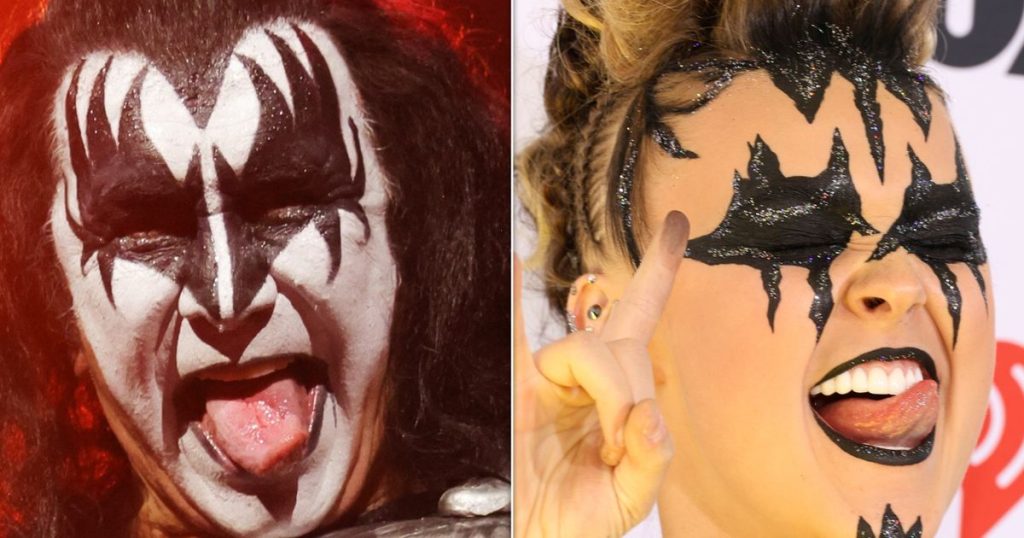Siwa’s outfit and makeup at the iHeartRadio Music Awards stirred controversy and backlash from fans and critics alike. The young star, known for her bright and colorful style, opted for a bold look with a bedazzled bodysuit and black face paint. Many people called out Siwa for cultural appropriation and insensitivity, pointing out the history and negative connotations of blackface. The choice to wear black face paint was seen as offensive and disrespectful, as it perpetuates harmful stereotypes and undermines the struggles faced by the African American community. Siwa’s decision to wear this outfit and makeup to a high-profile event like the iHeartRadio Music Awards also sparked conversations about celebrity privilege and accountability in using their platform responsibly.
Despite the backlash, Siwa has not issued a public apology or addressed the criticism directly. Some fans and supporters have come to Siwa’s defense, arguing that she may not have been aware of the implications of her outfit and makeup. However, others believe that as a public figure with a large following, Siwa has a responsibility to educate herself and be mindful of the messages she sends through her appearance and actions. The incident highlights the broader issue of cultural appropriation in the entertainment industry and the need for better education and awareness around the harmful effects of appropriating elements of other cultures for fashion or entertainment purposes.
The controversy surrounding Siwa’s outfit and makeup at the iHeartRadio Music Awards also raises questions about the role of stylists and other team members in shaping a celebrity’s image and decisions. While Siwa is known for her vibrant and playful style, it is unclear who was responsible for selecting and designing the outfit that caused such a stir. Some have argued that Siwa’s team should have been more vigilant in preventing her from wearing a potentially offensive costume, while others point to the importance of personal accountability for one’s choices and actions. The incident serves as a reminder of the power dynamics at play in the entertainment industry and the need for greater sensitivity and awareness when it comes to issues of cultural appropriation and representation.
In the aftermath of the iHeartRadio Music Awards incident, Siwa’s reputation and image have been called into question. Many fans and critics have expressed disappointment in the young star, whom they once viewed as a positive role model for young people. Siwa’s decision to wear black face paint and a bedazzled bodysuit has raised concerns about her judgment and understanding of complex issues surrounding race and cultural sensitivity. Some have called for Siwa to take responsibility for her actions and use this as an opportunity for growth and learning, while others believe that the damage to her reputation may be irreparable.
Moving forward, it is important for celebrities like Siwa to be more conscious of their choices and the impact they have on their audience and wider society. The incident at the iHeartRadio Music Awards serves as a cautionary tale for public figures about the consequences of insensitive and culturally appropriative behavior. It also underscores the need for greater education and awareness around issues of race, representation, and privilege in the entertainment industry. Siwa and other celebrities have a platform and influence that can be used for positive change, and it is crucial that they use their voices responsibly and thoughtfully to promote diversity, inclusion, and understanding.
Ultimately, the controversy surrounding Siwa’s outfit and makeup at the iHeartRadio Music Awards serves as a reminder of the ongoing work that needs to be done to combat racism, discrimination, and cultural appropriation in all its forms. While Siwa may have made a misstep in her choice of attire, the incident has sparked important conversations about race, representation, and accountability in the entertainment industry. It is crucial for celebrities and public figures to listen to criticism, learn from their mistakes, and strive to do better in the future. By acknowledging and addressing issues of cultural appropriation and insensitivity, we can work towards creating a more inclusive and respectful society for all.


